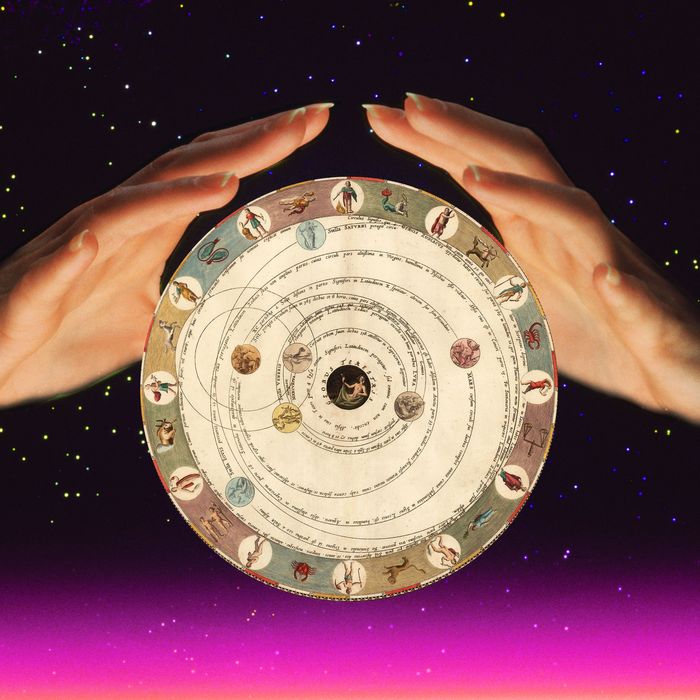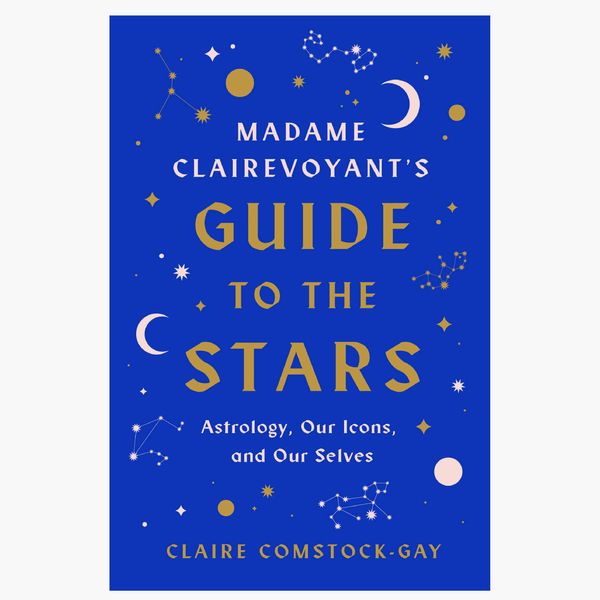
Some years ago you were born somewhere on planet Earth. You took your first breath and became a person with a body of your own — no longer existing inside your parent, no longer existing only in the future, but a full and distinct being, with your own needs, your own hunger, your own heart pumping your own blood through you. And this moment of brand-new personhood was the moment, astrologically speaking, that formed you: the broad outlines of your personality, the landscape of your heart, the challenges and desires and unthinkably miraculous gifts that would be yours as you move through the days and years of your life.
Though the possible uses for astrology are vast and varied — from planning a garden to predicting political unrest; from diagnosing illness to scheduling weddings — it shines brightest in our modern world not as a tool for deciphering omens and curses or foretelling our predestined lives and deaths, but as a mirror to our inner world. In a world with advanced satellite technology and cutting-edge medicine, astrology still offers something science cannot (although it may try): a sharp, wise, nuanced system for understanding ourselves and our messy lives and our mysterious, tangled-up feelings.
This is what many of us arrive at astrology in search of: a way to understand why we’re like this. Why are we so loud and so frustrating, or so hard to satisfy, or so desperate for reassurance or attention or praise? Why can’t we seem to just act normal, get our lives together, sand down the spikier parts of our personalities? Why can’t we manage to just force ourselves to be simple, to make our lives and our personalities small and clear and just like everybody else’s?
Astrology’s skeptics and detractors like to make a fuss about how foolish it is to imagine that, simply by looking to the stars, we can know what the future will bring. But to argue this is to completely misunderstand one of modern astrology’s central purposes — not to find our destinies, but to find our actually existing, living human selves.
ASTROLOGY HAS NOT, OF COURSE, always been used as a tool for introspection. In ancient Babylon, where astrology originated in the second millennium BCE, it wasn’t used to find insight into individuals’ lives or personalities but rather to understand and predict events in the world. The stars and planets were understood to offer omens and messages that could be used to maintain a ruler’s power, to predict weather, to provide insights into the best times for planting and harvesting crops. As it spread through the ancient world, it was practiced by scholars and clerics and monks — and even, in the medieval world, by physicians. Like any body of knowledge, though, astrology grew and changed and developed, and new astronomical concepts began to challenge astrology’s claim to scientific truth. Heliocentrism, in particular, undermined astrology’s practice of treating the sun as just another planet — although the most powerful one — revolving around the earth. And as astronomy’s authority expanded, astrology was demoted to “pseudoscience” — or, more tactfully, “something other than science.”
In spite of this, astrology and its influence didn’t disappear; its trajectory is strikingly different from, say, alchemy. What it did, instead, was adapt and proliferate. While serious astrologers continued to study and practice outside the mainstream, inside the mainstream, astrology was recast as something popular, accessible, and vaguely silly — particularly after British astrologer R. H. Naylor began publishing the first newspaper horoscopes in the 1930s. Relieved of its official institutional power (Nancy Reagan and her astrologer Joan Quigley notwithstanding), astrology was able to fill a new need. For while advancing scientific knowledge offered other, more verifiable ways of understanding weather or crop seasons or politics, our private inner worlds and our messy, complicated relationships with each other remained wild and mysterious, never fully explainable by science. And in this role astrology continues to thrive, accessible and anarchic, outside the halls of the academy, outside of our Enlightenment inheritance of logic and rationality.
Regardless of its current popularity, there is still a resounding lack of peer-reviewed evidence that astrology is “real.” When I first began learning about it, I found countless articles attempting to persuade readers of astrology’s nonscientific and disreputable nature, citing instances where astrology diverges from the astronomical reality of the sky, or referring to experiments that failed to find any evidence that astrology might “work,” or pointing to astrological predictions that turned out to be famously, massively wrong.
But this kind of thinking seems, at least to me, to miss the point. Trying to determine modern astrology’s accuracy or relevance with a scientific experiment seems nearly as unhelpful as it would be to use an experiment to determine the accuracy of Aretha Franklin’s voice, or the correctness of Pablo Neruda’s love poems, or the scientific validity of Yoko Ono’s conceptual performances. It’s possible to interpret and critique all of these things; it’s possible to love them or hate them; it’s possible for them to rise and fall and disappear from our cultural consciousness, but science can’t tell you whether they’re “right” or not.
Astrology’s tenacious refusal to disappear, to shrink before the dictates of our dominant modes of knowledge, is also, I truly believe, its own kind of magic. It offers us a chance to see ourselves and all the ways we’re too sensitive or noisy or ambitious, too sad or insecure or confrontational or rebellious. It gives us an interpretive model still largely unbound by rules of correctness or good taste, or by its own respectability. Astrology doesn’t know you better than you know yourself, but it might open the door into the more challenging rooms in your heart. How wonderful it is to be allowed this space that defies all our ideas about respectability in favor of a different kind of love — openhearted, potentially corny, potentially wrong!
After all, modern astrology has never really been about studying the planets or the sky. They aren’t our objects but our mirrors. The cosmic world reflects the human world, and the human world reflects the cosmos. Astrology encourages us to see ourselves not as isolated observers but as beings inextricably linked to the workings of the universe — as vast, as complicated, as beautiful and wild as the stars. For all its basis in the cosmos, astrology’s best gift to us is to serve as a tool for understanding what it is to be a person. The planets themselves may be physical facts, but our understanding of them can never be anything but human. The planets can only tell us what we’re willing to see; depending on our perspective from down here on earth, their messages to us can be limiting or liberating, restrictive or radical.
Ultimately, astrology can only be as wise and as generous as we are. The signs and their meanings are constantly changing and evolving, just as humans keep changing, just as the world keeps changing. An astrological chart might be celestially, mathematically pure, but our interpretations of that chart will always be human, limited by the things we can know and feel, by our particular life experiences, by the cultures we live in. Nobody — not even the wisest or most rigorous or most intuitive astrologer — has a direct line to the meaning of the sky. We’re all looking up from here on earth, doing our best to interpret what we see.
These interpretations will always be informed by our own consciousnesses, and limited by the same mental and material constraints that limit our everyday lives. The cultures we live in produce the lenses we use to look at the universe; the stories and jokes and gossip we grow up with determine the stories we learn how to tell. Even in astrology’s nonnormative world, cultural norms, gender roles, and white supremacy still shape the ways we’re able to see. Aries, for instance, is understood to be a “bold” sign, but how do we know what boldness really looks like? If you’re not paying close attention, only the loudest, most brazen types of boldness even register as bold at all. Astrology offers one way to practice seeing the types of Aries boldness, for example, that have been suppressed and ignored. It offers a fresh set of interpretive tools, a structured method for observing the world with curious, generous eyes, and for seeing ourselves and each other with clarity. But for this to happen, looking at the sky isn’t enough; it’s necessary to look around here on earth as well.
If you want to know, ultimately, why you are the way you are—why you’re like this and not like that—your sun sign alone won’t give you what you’re really looking for. Every one of the signs moves around you and through you. You interact with every one of the signs every day; every person you encounter is made of a complex mixture of astrological energies. The better you can learn to see each one, the wiser, more generous, more intuitive you’ll become.
Expanding our emotional vocabularies can seem like a frivolous undertaking right now, when oceans are rising and forests are burning and the most powerful people in the world seem hell-bent on making this planet unlivable for the rest of us. And it is, in some ways, slight: getting right with our feelings won’t be enough to save us. But asserting the value of our wild, multitudinous feelings is not unserious work. This is the work of acknowledging our enduring humanity; it’s the work of continuing to love and hold each other even in an unpredictable world.
MADAME CLAIREVOYANT’S GUIDE TO THE STARS. Copyright © 2020 by Claire Comstock-Gay. Reprinted here with permission of Harper, an imprint of HarperCollins Publishers.
The Cut’s astrologer-in-residence since 2016, Madame Clairevoyant is Claire Comstock-Gay, the author of new book Madame Clairevoyant’s Guide to the Stars. Speaking on the phone from her home in Minneapolis, Claire and Cut senior editor Jen Gann discussed the kind of people who want to argue about astrology, transits, and the moon. An edited and condensed version of their conversation is below.
How do you respond face-to-face if someone tells you that astrology isn’t “real” or scientific?
I think people really say that because they want me to kind of argue with them, right? They don’t want to be convinced, necessarily, but they do want me to argue with them. And it’s frustrating for them that I don’t care so much.
It doesn’t make a difference for me if people believe in it or not. I think astrology can be a useful tool for people to think about themselves and their lives, and if you think it’s not for you or you think it’s bad, it’s fine with me. I was at an event months ago — I was giving a talk at a library here — and I had clearly frustrated this woman so much at the end. She sat there with a frown on her face the whole time so that she could eventually ask me: What’s the deal? This is fake. You can’t say otherwise. And she just wanted me to argue with her so badly, and I wouldn’t do it.
I wonder why she chose to come to spend her evening there?
It’s very strange, right? That was like an hour out of her life, and she spent it in a room just mad at me about it. And I kind of think that astrology kind of gets some of its value from being disreputable in that way also. I don’t know that I would want everyone to suddenly fall in line and follow astrology. I think that it’s a little bit valuable as being against the dominant modes of thinking.
Do you have a favorite transit?
I don’t know that I do? My approach is more about whatever is happening. I find it really valuable to look at the moon, honestly. That’s kind of a basic one, but my astrology really is based in our feelings and our emotional world and the moon is all about our emotions. It’s also kind of the least abstract, for us. We can physically see the moon in the sky, and so that to me makes it very rich and rewarding.
If you buy something through our links, New York may earn an affiliate commission.



